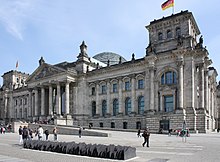Walter Stoecker
Walter Stoecker (born April 9, 1891 in Cologne ; † March 10, 1939 in Buchenwald concentration camp ) was a German communist politician.
Life
The son of an engineer completed a commercial apprenticeship after attending secondary school and in 1908 joined the SPD and the social democratic workers' youth movement in Cologne, where he was active together with Wilhelm Sollmann . From 1910 he worked in his hometown and in Kiel as a trainee and later as an editor for social democratic newspapers and in 1912 began studying history and economics in Leipzig, Zurich and Cologne, where he established socialist student groups. Drafted into the military in 1915 and a soldier until the end of the war, the war opponent Stoecker resigned from the SPD in 1917 and joined the USPD . During the November Revolution he was a leading member of the workers 'and soldiers' council in Cologne, at the end of 1918 he took over the management of the USPD newspaper Volkstribüne in Elberfeld and was elected to the city council of Cologne and the constituent Prussian state assembly in 1919 and in June 1919 as secretary of the USPD headquarters in Berlin appointed. In 1920 he was elected to the Reichstag , to which he belonged until July 1932.
In addition to Ernst Däumig and Wilhelm Koenen , Stoecker was one of the leading representatives of the left wing of the USPD, also operated its merger with the KPD , was a member of the executive committee of the united party from 1920 to 1921 and was counted among its most important members of parliament. From 1923 he was again a member of the board, he also became Polleiter of the Upper District West and, due to his alleged involvement in the failed Hamburg uprising in the autumn of 1923, was put out to search for the following parliamentary dissolutions on the basis of an arrest warrant. The the middle group belonging to the party Stoecker 1924 Chairman of the Communist Party faction in the Reichstag (to him in 1929 in December Ernst Torgler replaced) and took after the deposition of leadership to Ruth Fischer after a Comintern Intervention 1925 in the new leadership under Ernst Thalmann one an important role, which did not change due to Stoecker's brief support for a suspension of Thälmann from all party offices during the Wittorf affair in 1928. Stoecker, who was also chairman of the International League of Friends of the Soviet Union , lost importance in the party after 1930 and was no longer put up as a candidate in the Reichstag elections in 1932.
After the takeover of the Nazi Party in January 1933 Stoecker took the 7 February 1933 meeting of the illegal Central Committee of the Communist Party in the sports store Ziegenhals part in Berlin.
On the night of the Reichstag fire , he was arrested and imprisoned in the concentration camps Sonnenburg , Lichtenburg and, from 1937, Buchenwald, where he participated in the illegal camp resistance with Albert Kuntz and Theodor Neubauer . On March 10, 1939, Stoecker died of typhus in Buchenwald .
Stoecker's family managed to flee to Great Britain. His son Helmuth Stoecker returned to the Soviet occupation zone after the war and worked as a professor of history at the Humboldt University in Berlin .
Walter Stoecker's urn was later buried in the memorial of the socialists (urn collecting grave by the large porphyry memorial plaque on the right side of the curtain wall) at Berlin's Friedrichsfelde central cemetery. The urn of his widow Anna Elfriede, née Bayley, was given a place in the Pergolenweg grave complex at the Socialist Memorial.
Commemoration
In Berlin, since 1992, one of the 96 memorial plaques for members of the Reichstag murdered by the National Socialists has been commemorating Stoecker near the Reichstag building .
literature
- Helmuth Stoecker: Walter Stoecker. The early days of a German labor leader. 1891 - 1920. Dietz Verlag, Berlin 1970.
- Alexander Christov: We are the young guard of the proletariat! Workers' youth movement in the Cologne area. 1904-1919. Rheinlandia Verlag, Siegburg 2007, ISBN 978-3-938535-25-7 .
- Martin Schumacher (Hrsg.): MdR The Reichstag members of the Weimar Republic in the time of National Socialism. Political persecution, emigration and expatriation, 1933–1945. A biographical documentation . 3rd, considerably expanded and revised edition. Droste, Düsseldorf 1994, ISBN 3-7700-5183-1 .
- Stoecker, Walter . In: Hermann Weber , Andreas Herbst : German Communists. Biographical Handbook 1918 to 1945. 2., revised. and strong exp. Edition. Karl Dietz Verlag, Berlin 2008, ISBN 978-3-320-02130-6 .
Individual evidence
- ↑ List of participants
- ↑ Peter Hochmuth, Gerhard Hoffmann (ed.): Buchenwald, I cannot forget you. Pictures of life (PDF; 1.5 MB). In: Rosa Luxemburg Foundation, Texts 35, Karl-Dietz-Verlag, Berlin 2007, ISBN 978-3-320-02100-9 , p. 241
Web links
- Literature by and about Walter Stoecker in the catalog of the German National Library
- Walter Stoecker in the database of members of the Reichstag
- Walter Stoecker in the files of the Reich Chancellery
- Short biography
- Walter Stoecker: About Bakunism. ( Memento from April 29, 2007 in the Internet Archive )
| personal data | |
|---|---|
| SURNAME | Stoecker, Walter |
| BRIEF DESCRIPTION | German politician (SPD, USPD, KPD), MdR |
| DATE OF BIRTH | April 9, 1891 |
| PLACE OF BIRTH | Cologne , Germany |
| DATE OF DEATH | March 10, 1939 |
| Place of death | Buchenwald concentration camp |

